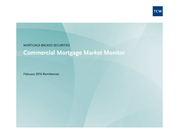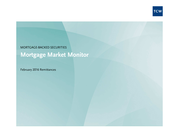Description
VIEWPOINT
Commonly Asked Questions on Emerging Markets Today
How do rising rates impact emerging market debt?
We also think we will see a marginal improvement in growth
on the demand side at some point over the next six months.
So we see oil and oil-related credits as perhaps interesting
investments as we move through 2016.
David Robbins:
The Fed issued an overall consensus statement, a generally
dovish hike, which was very well telegraphed. A lot of
emerging market central banks have been preparing for this.
And it’s really a function of the path that they take from here.
Emerging market debt offers a yield cushion, particularly
relative to other developed markets, so similar to this year
(2015), we think that should help mitigate the impact of rising
rates. Plus the starting point for spreads is around 60 basis
points wider than it was at the start of 2014. Also, if the Fed
is responding to stronger growth, that benefits emerging
markets, particularly countries like Mexico.
But if they hold off on future hikes due to growth fears or deflationary concerns, the markets won’t take that well. David Robbins: In addition, liquidity and capital flows are critical issues going forward. On the liquidity front, the EM market is very broad, and includes both high-quality investment-grade credits and high-yield credits. There is ample liquidity in the highgrade portion of the market, but where you see the illiquidity generally is in the high-yield portion of the market.
So it’s important to consider individual credits carefully, in terms of position sizing and when to exit a trade. You can’t always wait until your target price to sell and you have to be prepared for greater price volatility in light of smaller balance sheets on the street. What are the biggest risks to the market? Given thin liquidity in various parts of the market, flows matter even more. And you have to pay attention not only to the direction of flows, but to who’s invested where.
We pay a lot of attention to the percent of foreign ownership in local markets and the strength of the local investor base. We also monitor U.S. high yield flows, as negative sentiment in that market can spill over into emerging markets.
We, however, tend to find that those environments also present opportunities. If we feel like the market is getting frothy, we would generally look to ramp up cash levels and take advantage of technical-related selling. Penny Foley: Some of the major risks in the market go hand in hand – Chinese growth and commodity demand for example. Chinese growth continues to be a significant driver of commodity demand and demand in general, so the pace of Chinese growth is a significant risk. On that note, it is important to remember that oil is more of an operating input and therefore more responsive to changes in supply and demand dynamics.
Oil prices are likely to be choppy in the next two to three months as Iranian exports increase. However, we do expect that we could see more strength around the oil price going into the second half of the year on the back of increased financing stress in the shale oil sector (particularly in light of the fact that some producers currently benefit from price hedges struck at higher prices in the second quarter of 2015 and which roll off in the early part of 2016). This material is for general information purposes only and does not constitute an offer to sell, or a solicitation of an offer to buy, any security. TCW, its officers, directors, employees or clients may have positions in securities or investments mentioned in this publication, which positions may change at any time, without notice.
While the information and statistical data contained herein are based on sources believed to be reliable, we do not represent that it is accurate and should not be relied on as such or be the basis for an investment decision. The information contained herein may include preliminary information and/or “forward-looking statements.” Due to numerous factors, actual events may differ substantially from those presented. TCW assumes no duty to update any forward-looking statements or opinions in this document. Any opinions expressed herein are current only as of the time made and are subject to change without notice.
Past performance is no guarantee of future results. © 2015 TCW 865 South Figueroa Street | Los Angeles, California 90017 | 213 244 0000 | TCW.com | @TCWGroup 3 .
But if they hold off on future hikes due to growth fears or deflationary concerns, the markets won’t take that well. David Robbins: In addition, liquidity and capital flows are critical issues going forward. On the liquidity front, the EM market is very broad, and includes both high-quality investment-grade credits and high-yield credits. There is ample liquidity in the highgrade portion of the market, but where you see the illiquidity generally is in the high-yield portion of the market.
So it’s important to consider individual credits carefully, in terms of position sizing and when to exit a trade. You can’t always wait until your target price to sell and you have to be prepared for greater price volatility in light of smaller balance sheets on the street. What are the biggest risks to the market? Given thin liquidity in various parts of the market, flows matter even more. And you have to pay attention not only to the direction of flows, but to who’s invested where.
We pay a lot of attention to the percent of foreign ownership in local markets and the strength of the local investor base. We also monitor U.S. high yield flows, as negative sentiment in that market can spill over into emerging markets.
We, however, tend to find that those environments also present opportunities. If we feel like the market is getting frothy, we would generally look to ramp up cash levels and take advantage of technical-related selling. Penny Foley: Some of the major risks in the market go hand in hand – Chinese growth and commodity demand for example. Chinese growth continues to be a significant driver of commodity demand and demand in general, so the pace of Chinese growth is a significant risk. On that note, it is important to remember that oil is more of an operating input and therefore more responsive to changes in supply and demand dynamics.
Oil prices are likely to be choppy in the next two to three months as Iranian exports increase. However, we do expect that we could see more strength around the oil price going into the second half of the year on the back of increased financing stress in the shale oil sector (particularly in light of the fact that some producers currently benefit from price hedges struck at higher prices in the second quarter of 2015 and which roll off in the early part of 2016). This material is for general information purposes only and does not constitute an offer to sell, or a solicitation of an offer to buy, any security. TCW, its officers, directors, employees or clients may have positions in securities or investments mentioned in this publication, which positions may change at any time, without notice.
While the information and statistical data contained herein are based on sources believed to be reliable, we do not represent that it is accurate and should not be relied on as such or be the basis for an investment decision. The information contained herein may include preliminary information and/or “forward-looking statements.” Due to numerous factors, actual events may differ substantially from those presented. TCW assumes no duty to update any forward-looking statements or opinions in this document. Any opinions expressed herein are current only as of the time made and are subject to change without notice.
Past performance is no guarantee of future results. © 2015 TCW 865 South Figueroa Street | Los Angeles, California 90017 | 213 244 0000 | TCW.com | @TCWGroup 3 .









